- Home
- Neal Shusterman
Challenger Deep Page 11
Challenger Deep Read online
Page 11
“What honors?”
He smiles. “The honors of killing the parrot.”
74. In God We Trust
When I was younger, whenever I looked at dollar bills, I always had a strange sense that Washington was glaring at me. It was funny, and a little bit creepy. It wasn’t just Washington. Hamilton was totally judgmental with that perpetual smirk. Jackson was the worst. That disturbingly high forehead, and superior gaze, accusing me of spending my money unwisely. Only Franklin was friendly, but it wasn’t like I got to see him often.
Maybe this should have been a sign that something was seriously up with me. Or maybe everyone thinks nutty, quirky things like that. I mean, it’s not like I thought they were really looking at me—it was just a funny thought I’d bounce around for no particular reason. It never stopped me from actually using money. At least not until recently.
We always look for the signs we missed when something goes wrong. We become like detectives trying to solve a murder, because maybe if we uncover the clues, it gives us some control. Sure, we can’t change what happened, but if we can string together enough clues, we can prove that whatever nightmare has befallen us, we could have stopped it, if only we had been smart enough. I suppose it’s better to believe in our own stupidity than it is to believe that all the clues in the world wouldn’t have changed a thing.
75. Safety Locks
“We’re going on a trip,” your father tells you. You know he’s been crying.
“What kind of trip? Is it a cruise?”
“If you like,” he says. “But we’ve got to go; the ship sails soon.”
You can’t remember the last time you slept. Insomnia doesn’t cover this. It’s anti-somnia. A viral wakefulness that’s so contagious, it would wake the dead if you got close enough. You truly believe this. You fear it. Every thought that comes into your head becomes a truth to fear.
The voices are still speaking, but they haven’t slept either, so now they just grumble nonsense. You pick up the feelings behind their gibberish, though. Those feelings are not good. They brim with foreboding, bitter warnings, and hints at your importance in the universe.
You don’t want to take this trip. You have to stay here to protect your sister. She’s off with friends now. Away from home. But you need to be here when she gets back. And then you look into your parents’ bloodshot eyes, and you realize they want to protect her, too. And that it’s you she needs protection from.
You’re in the car now. Your parents talk, but their words are as jumbled as the voices inside, and although you know the car is just the trusty family Honda, your parents in the front seat begin to feel further and further away. Suddenly you’re in the back of a limo, and someone is sucking out the oxygen. You can’t breathe. You try to open the doors and jump out on the freeway, but the doors won’t open. Someone has put on the child safety locks. You curse and scream, and say the most horrible things. Anything to get them to stop and let you out, but they don’t. They try to calm you. Your father can barely drive the car with the commotion you’re causing, and you wonder if the horrible thing you’re worried about is a car accident that will kill you all, and maybe you’re the one causing it, so you put your head in your hands instead of trying to escape.
You go down a steep hill. Suddenly the car’s not a limo anymore, it’s a padded elevator, and you’re going down the diagonal slope of the black pyramid, into its hidden depths—deep, deep underground.
The vehicle pulls into a parking lot at the bottom of a hill. A sign out front says SEAVIEW MEMORIAL HOSPITAL, but it’s a lie. Everything is.
Five minutes later, your parents sit across from a chipmunk-cheeked woman with glasses too small for her face. They fill out paperwork, but you don’t care, because you’re not really here. You’re watching from an untouchable distance.
To keep yourself from pacing, you focus on the fish tank. A liquid oasis in a desert of uncomfortable institutional chairs. Lionfish, clown fish, anemone. An ocean, condensed and captured.
There’s a small child pounding the glass with his palm. The fish dart away, bumping their noses against the invisible barrier that contains their world. You know how this feels. Tormented by something incomprehensible and so much larger than yourself. You know how it feels to want to escape, only to be limited by the dimensions of your personal universe.
A mother calls to the boy in Spanish, then pulls him away when he doesn’t come, and you begin to wonder, Am I on the outside or the inside of that tank? Because the rules of “here” and “there” don’t have a clear place in your head anymore. You are as much the objects around you as you are yourself. Maybe you are in the tank with them. The fish may be monsters, and you may be afloat on a doomed vessel—a pirate ship, perhaps—unaware of the breadth and the depth of the peril it sails upon. And you hold on to that, because no matter how frightening that is, it’s better than the alternative. You know you can make that pirate ship as real as anything else, because there’s no difference anymore between thought and reality.
76. No Way to Stop It
I am trapped in a conspiracy of conspiracies. On one side, the parrot and I plot mutiny. Not so much with words, but with glances. Nods. Clandestine winks of his single seeing eye. My artwork seethes with secret messages for him. Or at least he thinks so.
On the other side, the captain and I plot the parrot’s end. He, too, winks at me with his one working eye, and decorates the walls of his quarters with what he calls “the telltale visions of a captain triumphant.”
“Share with no one the secret meaning of your creations,” he whispers to me. “We shall feed the parrot to the beasts of the deep, as your drawings suggest, and none will be the wiser.”
I know these two plots will come together like matter and antimatter, annihilating me in the explosion, but I see no way out. No way to stop it. It’s coming as surely as are the beasts that protect the mysteries of Challenger Deep.
77. Oil Slick
The hospital paperwork is signed. The deal with the devil is done. The lady with the cheeks and small glasses looks at you with a gaze of false but practiced kindness.
“It’s gonna be okay, sweetie,” she says, and you glance behind you, wondering if maybe she’s talking to someone else. You and your parents are led to a different wing of the hospital. A specialized wing. Your parents grip each other. A single creature with four weeping eyes.
You think you’re okay with this, because you still watch it all from a distance, until it’s time for your parents to head for the door, and you realize there is no distance at all. You are here and about to be stranded terrifyingly alone. You are about to be keelhauled, and all the premonitions join together into one and you know for a fact beyond any doubt that something terrible will happen to you, to your parents, to your sister, to your friends, but mostly to you if they leave you here.
So you panic. You’ve never been violent, but now your life depends on fighting your way free from this. The fate of the very world depends on you being anywhere but here.
But they’re shrewd. They’re sly. Brawny men in pastel scrubs descend on you from nowhere. They grab you and hold you back.
“No!” you scream. “I’ll be good! I won’t do it anymore!” You don’t even know what “it” is, but whatever it is you’ll stop if you don’t have to be left here.
Hearing your pleas, your parents hesitate by the door as if they might change their minds—but a nurse in a pastel-pink outfit comes between you and them.
“The longer you stay,” she tells your parents, “the harder it will be for him, and the harder it will be for us to do our jobs.”
“They’re killing me!” you scream. “They’re killing me!” And just by hearing yourself say it, it becomes true, but your parents turn around and escape through a series of doors that open and close like canal locks, going out into a night that seems to have fallen from daylight only seconds ago. Now you think that maybe you were right. Maybe they’re not your parents at all, but impostor
s.
Your adrenaline makes you almost stronger than the three pastel men holding you. Almost. In the end they wrestle you into a room, and onto a bed, and you feel a sharp sting in your ass. You turn just in time to see a nurse pulling away a hypodermic needle, its lethal load already delivered. In seconds your arms and legs are secured in padded restraints, and you feel the shot begin to take effect.
“You rest up, dear, everything will be fine,” the nurse tells you. “You’ll be better for this.”
Then the poison they put in your ass reaches your brain, and your mind spreads thin like an oil slick on the surface of an ocean.
And you discover, for the first time, the White Plastic Kitchen. A place you will visit again and again. A gateway to all the places you don’t want to be.
78. Realm of the Forgiving Sun
I have this dream. I’m lying on a beach someplace where they don’t speak English—or if they do, it’s only because so many American tourists are there, spending money they don’t have on things they don’t need, and burning lobster-red beneath an unforgiving sun.
The sun forgives me, though. It forgives all of us—my mom, my dad, and my sister. It sheds warmth and light upon us without any threat of consequence. No sunscreen required.
The sounds here are all sounds of joy. Laughter. Children playing. The voices of bargaining beach vendors who sell shiny wares with such charisma that people can’t resist them. Happy tourists walk away festooned in silver and gold, their new jewelry jingling like Christmas bells with every step.
My sister plays in the gentle turquoise surf, looking for shells. The hiss of waves breaking at her ankles is a gentle sigh, as if the sea itself has found lasting contentment.
My parents hold hands and walk along the beach. My father wears his favorite white straw fedora, saved exclusively for tropical vacations, because it looks so ridiculous anywhere else. There’s no talk of bills or taxes, and he has no numbers to crunch. Mom is happily barefoot, and no matter how warm the sun is, the sand stays cool. She has no one’s teeth to clean today. They both stroll with an easy pace that speaks of no destination.
As for me, I sit in the sand, enjoying the gritty feeling as it sifts through my wriggling toes. In my hands is a tall glass with a cool drink beaded with condensation that catches the sunlight, refracting it like a kaleidoscope. I sit there on the beach, and I do absolutely nothing. I think absolutely nothing. I am satisfied just to be in the moment.
In this place, there is no kitchen except for an outdoor grill serving up shrimp further along the beach. The aroma is pleasing; a carnal incense like burnt offerings to the God of Infinite Vacation.
In this place there is no ship but the sleek racing yacht sailing out of the bay, blown by a custom-made zephyr, sending it off to points even more exotic than this.
Everything feels right with the world . . .
. . . and the sad thing is that I know it’s a dream. I know it must soon end, and when it does I will be thrust awake into a place where either I’m broken, or the world is broken.
So I curse the perfect beach, and the cool, quenching drink that I can feel in my hand, but can never, ever raise to my lips.
79. Submitted for Your Approval
Consciousness is a relative concept when you’re pumped full of psychoactive meds. It’s not an either/or proposition. It’s as if the interface between being asleep and being awake has gone supernova, exploding and swallowing everything around it with cosmic shrapnel. Nothing survives but an abiding sense of being elsewhere. A place where time isn’t a straight, predictable line, but is more like a toddler’s knotted shoelace. A place where space bubbles and twists like a funhouse mirror in four dimensions, and everyone’s a scary clown. You are the little faceless figure falling through a world of shadow and substance at the beginning of The Twilight Zone, cottony thoughts leaking from your oblong head.
Rod Serling must have been severely psychotic when he came up with that show.
80. Salted Slug
Sometimes you realize you’re on a bed in a hospital. Sometimes you’re convinced it’s the White Plastic Kitchen. And other times you’re certain that you’ve been sewn to the billowing sails of a ship. The dizziness is real, and some of the faces are, too, but good luck figuring out which ones, and what they really look like. They tell you that you were only “restrained” on that first night when you appeared to be violent, but it still feels like you’re tied to the billowing bed.
People come and go, talking to you, and you hear yourself respond, but don’t feel your lips making the words. You don’t feel your toes or fingertips either.
“How are you feeling?”
You’re asked this a lot. Or maybe you’re only asked it once, and the other times are just echoes.
“Salted snail,” you hear yourself say in a medicated slur. “I think I peed myself.”
“Don’t you worry about that. We’ll take care of it.”
You think maybe they’ll put you in one of those adult diapers, and then realize that maybe they already have, but you can’t tell, and don’t want to find out. You want to retreat into your shell, spiraling in and in and in, but you realize you don’t have a shell. You’re more of a slug than a snail. You have no protection at all.
Through all of it, the voices in your head are still talking at you, but they’re too stoned to have much impact, and you realize this isn’t all that different from chemotherapy for cancer. They bombard the whole body with bad crap, hoping it will knock out the disease, and leave the rest alive. The question is, will poisoning the voices kill them, or just make them really, really pissed off?
81. War of the Nemesi
“Today,” says the captain in his most commanding voice, “I shall share a tale of these waters that I do not need a lore-master to verify, for this one I know by heart.”
The parrot, growing wary, takes a healthy sidestep away, perhaps not wanting to associate himself with anything the captain says.
“It begins with a great captain, name of Ahab,” he tells us, “and ends with another captain, name of Nemo.”
And although I know I’m risking another brand on my forehead or worse, I say, “Excuse me, but I don’t believe those two fictional characters ever met.”
“They did, boy!” says the captain, with far more patience than I expected. “In fact, they were fast friends—which was part of the problem. However, this story is less about them, and more about their great Nemesi.”
I consider pointing out that nemesi might not actually be the plural of nemesis, but I figure I’ll quit while I’m ahead.
“The Nautilus, that mysterious submarine that carried Nemo for twenty thousand leagues and more, was under endless siege by the giant squid that threatened to take her down to the depths. As the Nautilus raced away from the squid, it chanced to encounter the Pequod, and Ahab, in pursuit of the white whale. There was a collision, and the Pequod was sunk.” Then he looks at me and says mockingly, “You would tell me that it was the whale that took the ship and its captain down, but Melville was wrong. His story was a fabrication told to him by Ishmael, who was sworn to keep the captain’s secret.”
The parrot whistles with either disgust or appreciation at the spandex flexibility of the yarn.
“Be that as it may,” continues the captain, “Nemo rescued Ahab from the water, and in a single glance, the two captains realized they were men of like minds, and sailed off in the submarine until they found the Sea of Green, and thus lived happily ever after.” He pauses, perhaps expecting applause, but receives none, so he continues. “Their beasts, however, found no such affinity for each other.” Then the captain spreads out his arms and his eye goes wide. “Huge they were, the white whale and the giant squid. Grotesque freaks of nature, but of opposing sorts. Sentient and strange was the squid, confounding the sea around it with inky darkness. An eight-armed monstrosity—a beast of chaos that defied all logic. The whale, on the other hand, was all sense and seemliness. Its great echolocating bra
in could calculate dimension and distance. It knew everything worth knowing about the world it inhabited, while the squid saw nothing beyond the cloud of its own ink. Naturally they despised each other.”
Then he pounds his fist on the table so hard it makes all of us jump, and the parrot flaps his wings powerfully enough to lose a few feathers. “Great men of the sea must never abandon their beasts!” the captain announces. “Now, thanks to those two neglectful men, their Nemesi are doomed to wage war against each other until the end of time, growing angrier and angrier with each passing year!” He takes a moment to stare each of us down before he says, “Any questions?”
We all look to one another. Clearly there are plenty of questions, but no one wants to put any forth. Finally Bone-boy apprehensively raises his hand, and when called on says,
“Huh?”
The captain takes a deep breath and empties his lungs in an exasperated sigh that I can feel like a gale. “The moral of the story is that we must not free ourselves from our beasts. Nay—we must abandon all else in this world but our beasts. We must feed them as much as we fight them, submitting to loneliness and misery with no hope of escape.”
The girl with the pearl choker nods approvingly. “I get that.”
But it sits so badly with me that I can’t stop myself from voicing disagreement. “It’s not right!”
All eyes turn to me. I can already see a minus being branded next to my F.
“Elucidate,” the captain growls. I know it’s a warning, but it’s one that I refuse to heed.
“If those captains found a way to leave their monsters behind, they deserve whatever peace they find. They deserve resolution. And the beasts . . . well, they deserve each other.”

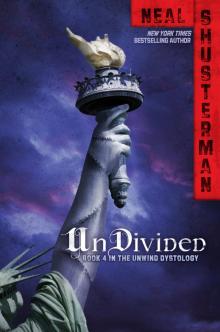 UnDivided
UnDivided UnBound
UnBound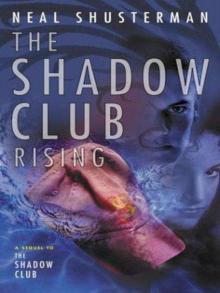 The Shadow Club Rising
The Shadow Club Rising Scorpion Shards
Scorpion Shards UnWholly
UnWholly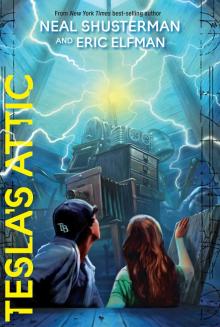 Tesla's Attic
Tesla's Attic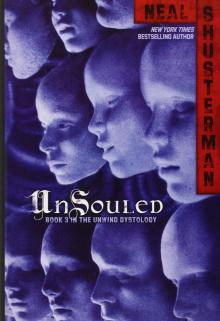 UnSouled
UnSouled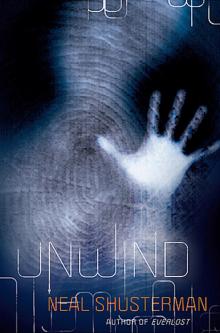 Unwind
Unwind Violent Ends
Violent Ends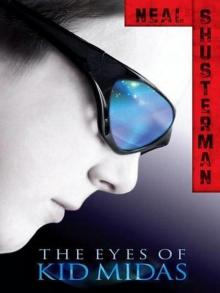 The Eyes of Kid Midas
The Eyes of Kid Midas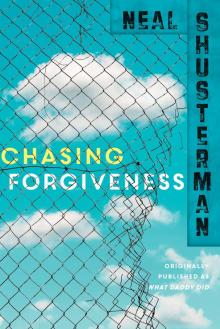 Chasing Forgiveness
Chasing Forgiveness Everfound
Everfound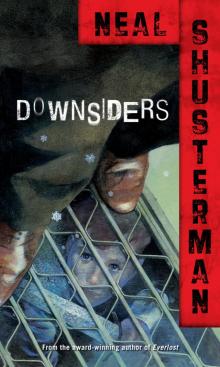 Downsiders
Downsiders The Schwa Was Here
The Schwa Was Here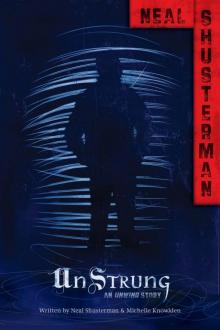 UnStrung
UnStrung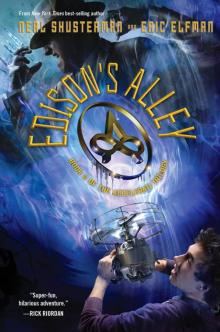 Edison's Alley
Edison's Alley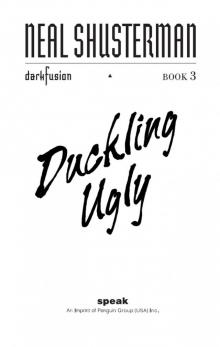 Duckling Ugly
Duckling Ugly Everlost
Everlost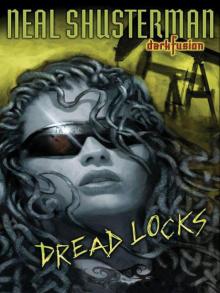 Dread Locks
Dread Locks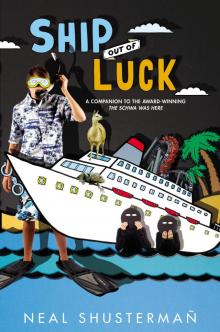 Antsy Floats
Antsy Floats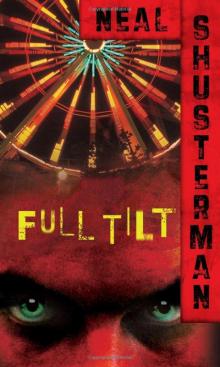 Full Tilt
Full Tilt Thunderhead
Thunderhead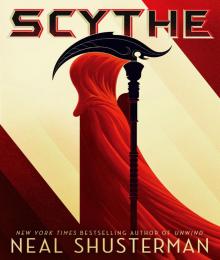 Scythe
Scythe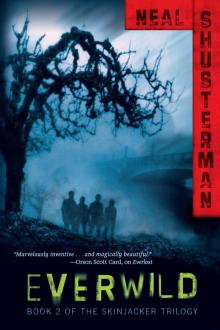 Everwild
Everwild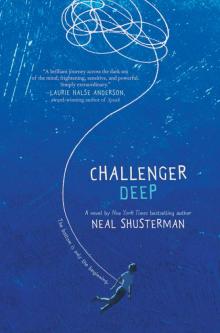 Challenger Deep
Challenger Deep Shattered Sky
Shattered Sky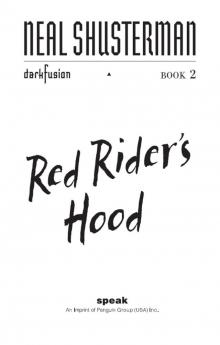 Red Rider's Hood
Red Rider's Hood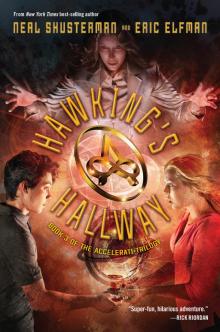 Hawking's Hallway
Hawking's Hallway Antsy Does Time
Antsy Does Time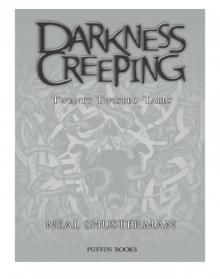 Darkness Creeping: Twenty Twisted Tales
Darkness Creeping: Twenty Twisted Tales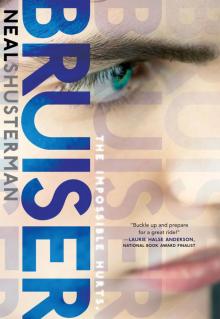 Bruiser
Bruiser Thief of Souls
Thief of Souls The Toll
The Toll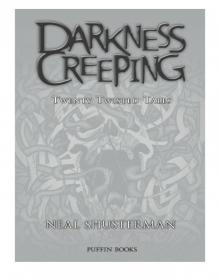 Darkness Creeping
Darkness Creeping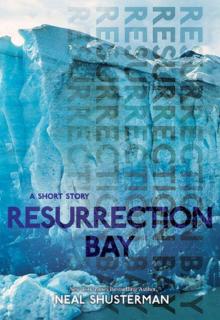 Resurrection Bay
Resurrection Bay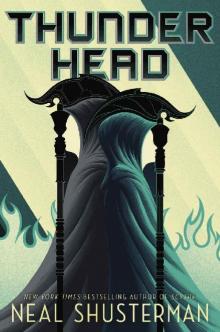 Thunderhead (Arc of a Scythe Book 2)
Thunderhead (Arc of a Scythe Book 2)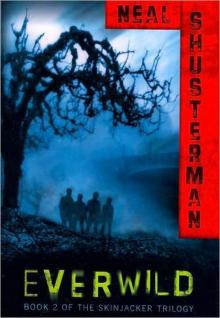 Everwild (The Skinjacker Trilogy)
Everwild (The Skinjacker Trilogy) Everfound s-3
Everfound s-3 Edison’s Alley
Edison’s Alley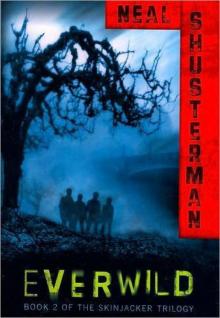 Everwild s-2
Everwild s-2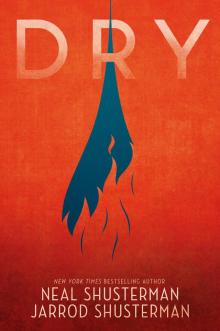 Dry
Dry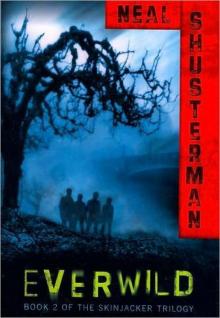 Skinjacker 02 Everwild
Skinjacker 02 Everwild Everlost s-1
Everlost s-1